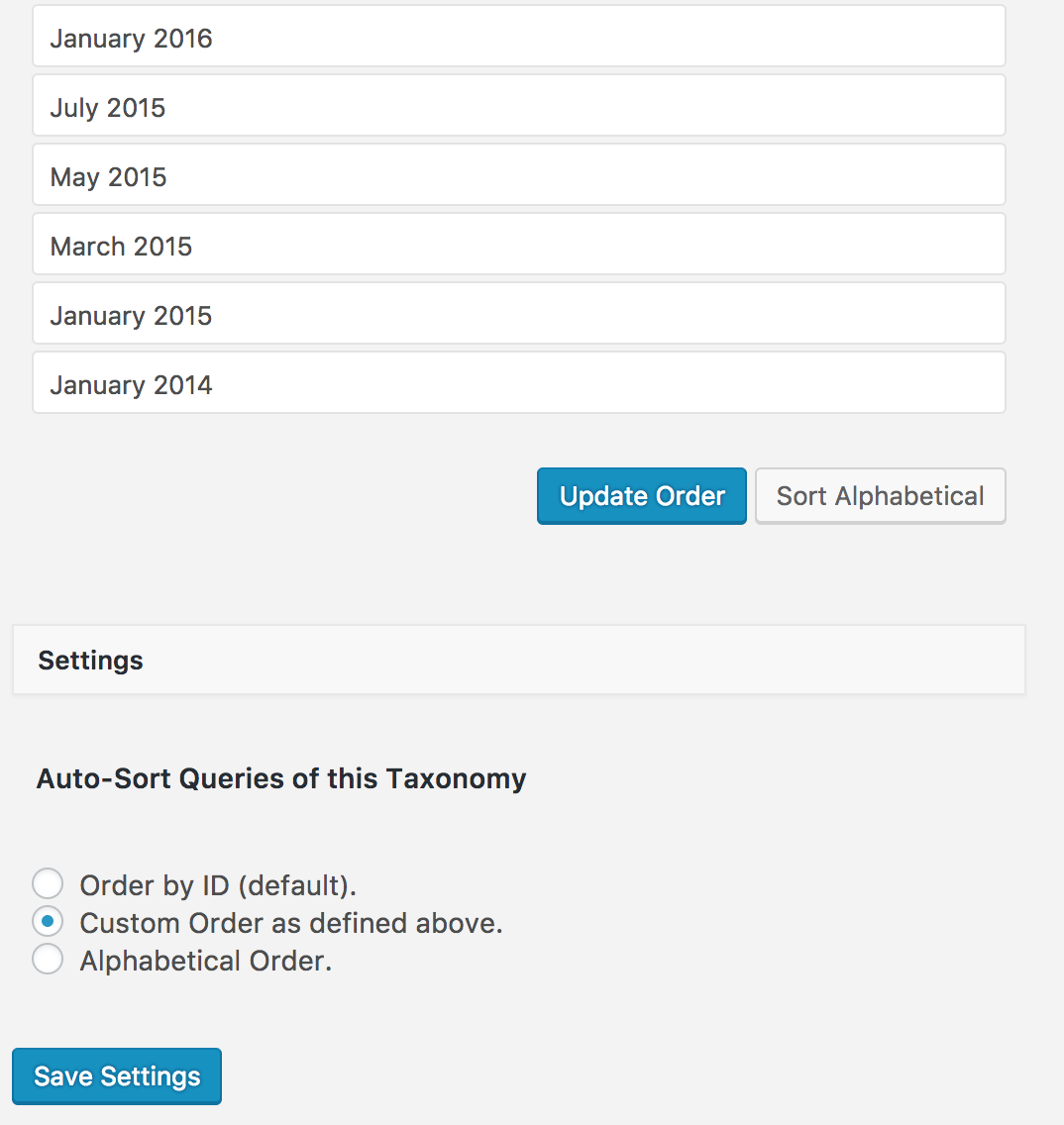Well, I’d like to expose my experience in sorting custom post types by category/taxonomy.
THE WEB
- A travel agency web site running on WordPress
- Main content on custom post type called ‘ruta’
- Taxonomy with this structure Type-of-travel > continent >country
THE CASE
In archive category list pages, the client wanted the posts to be sorted by
- The continent, ordered by number of routes on each one.
- The country, ordered alphabetically.
THE STEPS
First, I catch the request from the unmodified archive page query which happened to be like this:
SELECT SQL_CALC_FOUND_ROWS wp_posts.ID
FROM wp_posts
INNER JOIN wp_term_relationships ON (wp_posts.ID = wp_term_relationships.object_id)
WHERE 1=1
AND ( wp_term_relationships.term_taxonomy_id IN (5,6,7,8,9,10,11,12,13,15,16,17,18,19,20,21,22,23,25,26,28,29,31,32,33,35,38,95,101,102,193) )
AND wp_posts.post_type IN ('ruta', 'nav_menu_item')
AND (wp_posts.post_status = 'publish' OR wp_posts.post_author = 45
AND wp_posts.post_status = 'private')
GROUP BY wp_posts.ID
ORDER BY wp_posts.post_date DESC LIMIT 0, 20
Second, I edited the sql code in Sequel Pro against the database to conform my needs. I come out with this (yes, probably it can be improved: my
knowledge on MySQL is not outstanding):
SELECT SQL_CALC_FOUND_ROWS wp_posts.ID, tt1.parent AS pare,
(
SELECT COUNT(*)
FROM wp_posts
INNER JOIN wp_term_relationships ON (wp_posts.ID = wp_term_relationships.object_id)
INNER JOIN wp_term_taxonomy AS tt1 ON ( tt1.term_taxonomy_id = wp_term_relationships.term_taxonomy_id )
INNER JOIN wp_term_taxonomy AS tt2 ON ( tt2.term_taxonomy_id = tt1.term_taxonomy_id )
WHERE 1=1
AND tt1.parent = pare
) AS Total
FROM wp_posts
INNER JOIN wp_term_relationships ON (wp_posts.ID = wp_term_relationships.object_id)
INNER JOIN wp_term_taxonomy AS tt1 ON ( tt1.term_taxonomy_id = wp_term_relationships.term_taxonomy_id )
INNER JOIN wp_terms ON ( tt1.term_id = wp_terms.term_id )
WHERE 1=1
AND ( wp_term_relationships.term_taxonomy_id IN (5,6,7,8,9,10,11,12,13,15,16,17,18,19,20,21,22,23,25,26,28,29,31,32,33,35,38,95,101,102,193) )
AND wp_posts.post_type IN ('ruta', 'nav_menu_item')
AND (wp_posts.post_status = 'publish' OR wp_posts.post_author = 45
AND wp_posts.post_status = 'private')
GROUP BY wp_posts.ID
ORDER BY
total DESC,
wp_terms.name
Third, I hooked the query on the functions.php file with three filters: posts_fields, posts_join and posts_orderby
The code in functions.php:
function xc_query_fields( $fields ) {
$fields = "wp_posts.ID, wp_posts.post_title, wp_terms.name, tt1.parent AS pare,
(
SELECT COUNT(*)
FROM wp_posts
INNER JOIN wp_term_relationships ON (wp_posts.ID = wp_term_relationships.object_id)
INNER JOIN wp_term_taxonomy AS tt1 ON ( tt1.term_taxonomy_id = wp_term_relationships.term_taxonomy_id )
INNER JOIN wp_term_taxonomy AS tt2 ON ( tt2.term_taxonomy_id = tt1.term_taxonomy_id )
WHERE 1=1
AND tt1.parent = pare
)
AS Total";
return $fields;
}
function xc_query_joins( $join ) {
$join .= "INNER JOIN wp_term_relationships ON (wp_posts.ID = wp_term_relationships.object_id)
INNER JOIN wp_term_taxonomy AS tt1 ON ( tt1.term_taxonomy_id = wp_term_relationships.term_taxonomy_id )
INNER JOIN wp_terms ON ( tt1.term_id = wp_terms.term_id )";
return $join;
}
function xc_query_orderby( $join ) {
$join = "total DESC, wp_terms.name ";
return $join;
}
Finally I triggered the filters from the pre_get_post hook according to some conditions
function filtra_queries( $query )
{
if ( is_archive() && $query->is_main_query() && !is_admin() ) {
$rutes = array('viajes-privados', 'asia', 'africa', 'oceania', 'america', 'oriente-proximo');
if ( in_array( $query->get('category_name'), $rutes ) )
{
add_filter( 'posts_fields', 'xc_query_fields' );
add_filter( 'posts_join', 'xc_query_joins' );
add_filter( 'posts_orderby', 'xc_query_orderby' );
}// end if in_array
}// end if is_archive
}
add_filter('pre_get_posts', 'filtra_queries');
Hope this can help somebody

